Is Julius Malema the new Nelson Mandela?
How a radical leader with a checkered past is winning voters away from the party of Nelson Mandela and inspiring a new kind of politics
PRETORIA, SOUTH AFRICA – MAY 04: Commander and chief of the Economic Freedom Fighters and South African presidential candidate Julius Malema greets supporters as he enters the Lucas Moripe Stadium for an Economic Freedom Fighters presidential campaign rally at the Lucas Moripe Stadium on May 4, 2014 in Pretoria, South Africa. The rally comes prior to the South African presidential elections which are scheduled to be held on May 7, 2014. (J. Countess/Getty Images)
Share
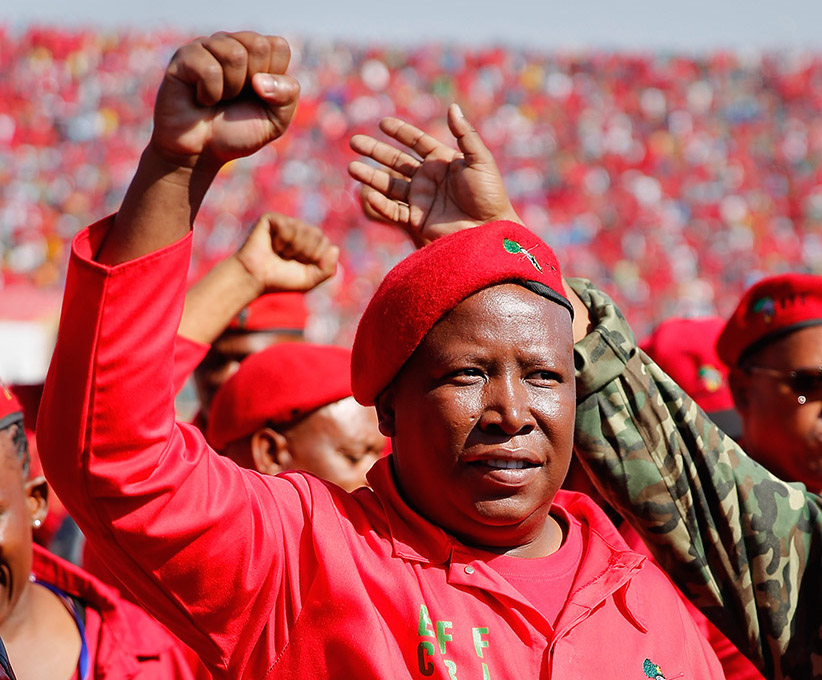
Last month in South Africa, deadly, xenophobic riots erupted that left seven dead, following remarks made by a Zulu king, and later supported by President Jacob Zuma’s son, Edward, that foreigners should “go back to their countries.” As the violence continued to spread, African countries started repatriating their citizens, while condemning the ruling African National Congress (ANC) government for not quelling the riots. Yet, as usual, the strongest criticism came from Julius Malema, the former star politician of the ANC, turned leader of the country’s third-biggest party, who said in parliament in mid-April what every South African was thinking:
“Your own son continues to say these people must be killed,” said Malema, addressing the assembly in a booming baritone voice much older-sounding than his 34 years. “You stand up here and you do not say anything.” It was an uncomfortable moment: Zuma fidgeting with his shirt collar, tugging it away from his throat before looking down at the floor. “How can you rule the country when you cannot rule your own family?” continued Malema. “We have a responsibility from these incidents of xenophobia to teach our people that peaceful resolution is a sustainable solution to every problem.”
For years the opposition has tried to take down Zuma. Embroiled in multiple corruption scandals—including using taxpayer money to fund $24 million worth of upgrades to his private mansion—it should have been easy. But no one has been as effective as Malema, Zuma’s former protégé, since being elected into parliament at the helm of his populist Economic Freedom Fighters (EFF) party.
Malema’s fierce outrage and searing wit— Zuma, he once said, is a “man of tradition, a tradition of empty promises”—have made parliamentary TV a must-watch event and put Zuma on the back foot in a way the mostly white official opposition never has. His party has ushered in a new era in South African politics that sees disillusioned middle-class voters leaving the party of Nelson Mandela in droves.
From the archives: Where is the South African protest now?
At less than a year old, the EFF won over six per cent of the vote in last year’s 2014 elections. Malema’s radical-left platform calling for forced land redistribution from whites and nationalization of state resources may not be what Western investors have in mind for South Africa, the continent’s most developed economy, but his defiance is proving to be a siren song for a key demographic of voters. The EFF call each other comrades, wear Hugo Chávez-inspired red berets, red coveralls and gumboots to parliament—theatrical outfits they say reflect their blue-collar constituents—all while taking the ANC to task for increasing corruption, high unemployment and lack of basic services.
Malema is, however, no stranger to corruption and controversy himself. When he was expelled from South Africa’s ruling party in 2011, his political career appeared to be finished. The ANC found “Juju”— Malema’s deceptively infantile moniker—guilty of bringing the 99-year-old liberation party into disrepute after maliciously comparing President Zuma to his predecessor, Thabo Mbeki, and calling for regime change in neighbouring Botswana. Malema, a pot-bellied man with a gleaming white smile, had to step down as the president of the ANC Youth League.
Almost a year later, he was charged by the South African Revenue Service over $1.6 million in unpaid taxes. Forced to sell his unfinished Johannesburg mansion, in 2013 Malema was photographed at his farm under a cloudy sky, standing in the dirt between rows of knee-high cabbages. Malema said then he was a leper who had “lost a lot of friends.” It would have been the defining image of a spectacular fall—the untouchable politician reduced to the working-class man he always said he represents (except for the Hugo Boss slacks he was wearing). Yet it was only the beginning.
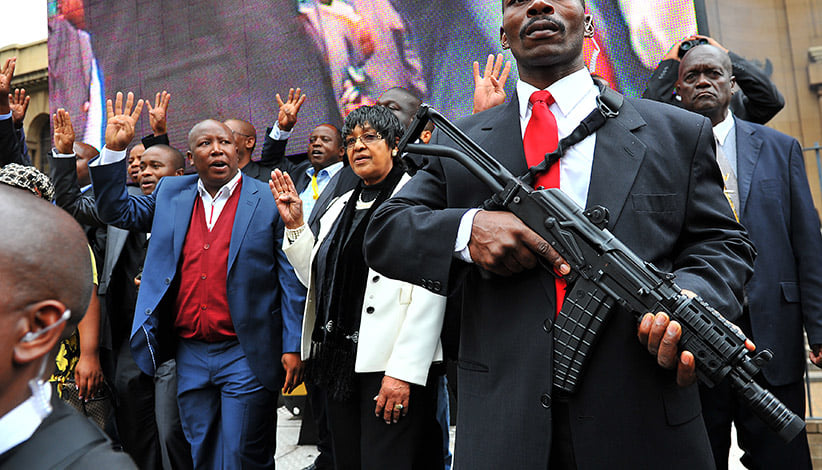
Sitting in his sparse party headquarters in downtown Johannesburg, decorated with only a flat-screen television on the wall and painted red doors, Malema explains that his expulsion from the ANC was what he needed to move forward. “Supporting Jacob Zuma was my biggest regret, but you know, politically everything happens for a reason,” says Malema, wearing jeans and a mustard yellow T-shirt printed with the face of Thomas Sankara, an ’80s revolutionary populist from Burkina Faso, a West African country. “My expulsion from the ANC was necessary,” he tells Maclean’s. “It had to happen so there could be the birth of a radical movement.”
For some, Malema is like a young Mandela, who, in his 30s, was also an insubordinate firebrand who took the ANC Youth League in a more radical direction, eventually founding Umkhonto we Sizwe (Spear of the Nation), the armed division of the liberation movement. Indeed, when asked what historical figure he identifies with, Malema cites Mandela and his ex-wife, Winnie Madikizela-Mandela, a morally ambiguous liberation hero who happens to be one of his staunchest supporters. In 2011, flanked by mean-looking security guards carrying guns, South Africa’s “Mother of the Nation” planted a big kiss on Malema when he was being tried for hate speech after singing Shoot the Boer, an apartheid-era song that calls upon blacks to shoot white farmers. Then, when Malema was in the process of being expelled by the ANC, Winnie campaigned on his behalf, giving evidence that Malema was just like her former husband.
Yet whereas Mandela was born almost a century ago into tribal royalty, Malema grew up during apartheid as an only child to a single mother. They lived in his grandmother’s house in Seshego, a dusty, poverty-stricken township outside the northern city of Polokwane that was dubbed Masakaneng, the Sepedi word for the hemp sacks the inhabitants used as curtains. Police harassment was a feature of township life. “The area was politically charged, all boys would be raided at night and be arrested by police,” says Malema. “Our parents actually used to force us to wear dresses and we slept in dresses to avoid a possible arrest.” Politics was a way out. “We were told there is a solution to put a stop to that nonsense,” says Malema. “We were told that solution was having a first black president.” He listened and never looked back.
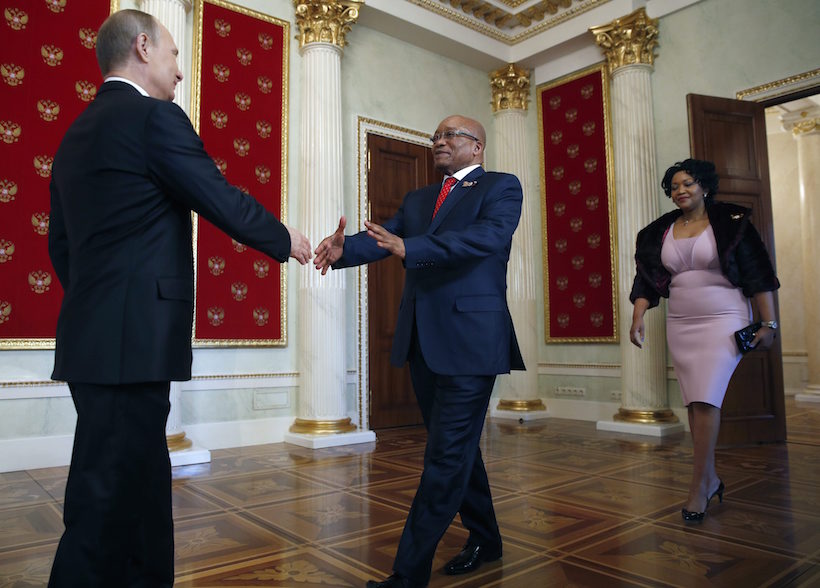
To understand the zeitgeist that is Malema —and South African politics today—it helps to look at the province where the majority of the EFF constituency lives. Gauteng is home to 12.9 million people, almost a quarter of South Africa’s population, who live mostly in the cities of Johannesburg (the bustling financial hub of the country), Tshwane (the straight-laced administrative capital also known as Pretoria), and Ekurhuleni (an industrial powerhouse). The three metros help generate the most wealth out of any province in South Africa, contributing 34 per cent of the national economy. The province’s residents earn more money and have better access to basic services. They are well-educated and aspirational. Singers make music videos that show them living it up in the clubs of Sandton, the district home to the Johannesburg Stock Exchange, where jailed Paralympic star Oscar Pistorius used to party. In short, Gauteng is a triumph of post-apartheid South Africa, the embodiment of a black middle class inconceivable under whites-only rule.
But the middle class—not poor enough to live off government grants and educated enough not to blindly follow the ANC—is angry. Despite its wealth, unemployment in Gauteng sits at 25 per cent (36 per cent for youth). Hundreds of thousands of people still live in townships, sprawling expanses of corrugated steel shacks plagued by crime. The frustration has manifested itself in violence; 2014 saw a record number of 176 protests over the lack of basic services, with the majority of them happening in Gauteng. This year, waves of angry mobs have looted mom-and-pop shops owned by foreigners, saying they were stealing their jobs.
Corruption scandals, meanwhile, make newspaper headlines weekly, many featuring President Zuma, who is facing the reinstatement of more than 700 corruption charges linked to a multi-billion-dollar military equipment deal. Consequently, support for the ANC has dropped the most in Gauteng, with the bulk of people saying “corruption is the greatest threat to our democracy,” according to a survey done by the Gauteng City-Region Observatory, a government-funded research organization. The result is that for the first time since apartheid ended two decades ago, voters are abandoning the ruling party. “It’s people not getting what they expected, or what they deserve from the system,” says David Everatt, executive director of the Gauteng City-Region Observatory. “Or they look ahead and see the system will offer them nothing.”
From the archives: Dissent rises in South Africa
No one has seized on this frustration among urban voters better than Malema. “We are not scared to confront the most powerful organization,” said Malema, addressing a crowd of 25,000 at an EFF rally in a township outside Pretoria days before the national vote in May last year. The crowd roared with support, blowing earsplitting whistles. “Gone are those days politicians must be worshipped as royalty,” said Malema. “They are not royalty, they are our servants.”
The message resonated. Young, urban voters turned out for Malema’s EFF, part of a surge of opposition votes that almost cost the ANC control of its powerful metros. “Well-educated African voters are voting EFF as a protest vote,” says Everatt. The 2014 election saw the ruling party limping away with 62 per cent of the vote, the lowest level of support since Mandela was elected the country’s first black president in 1994. In next year’s municipal elections, the ANC is poised to lose even more. While that doesn’t mean an opposition party will claim the majority, it does mean pluralism has finally arrived in South Africa. “Come the tabling of the first city budget, if all the opposition parties got together then they can defeat it,” says Everatt of a possible scenario in 2016. “That’s never happened in our democratic history.”
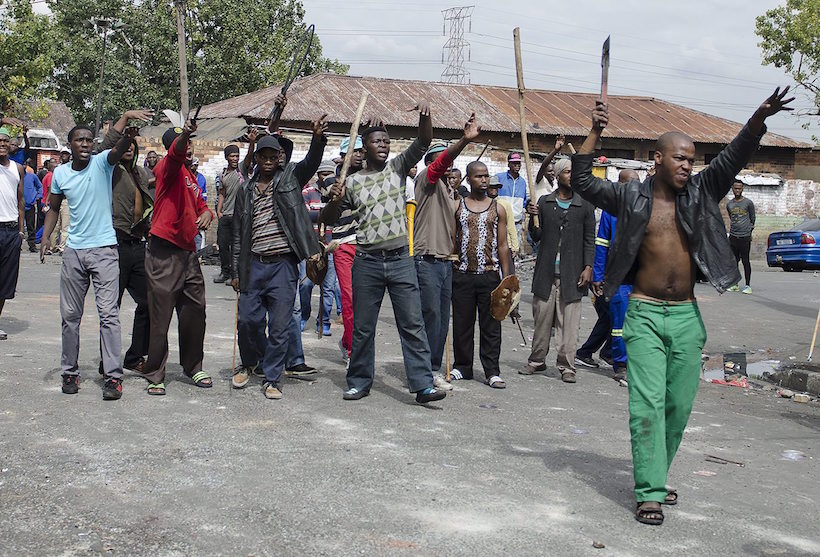
Malema has never been louder in the run-up to the municipal elections as he advocates nationalization of state resources, black economic empowerment and, most recently, calls for the destruction of colonial (white) statues. Last year, he left Zuma squirming in parliament when he started chanting “pay back the money” in reference to the president’s taxpayer-funded mansion, a phrase now in South Africa’s public lexicon. In February, during President Zuma’s state of the nation address, the EFF started the chant again. In response, the ANC called police into parliament to forcibly evict the EFF, another first for the South African government since apartheid. Instead of being criticized for his disorderly conduct, Malema was praised for holding the ANC to account, while the ruling party was roundly shamed for using draconian tactics more fitting to a dictatorship than a democracy.
There are videos with more than 400,000 views on YouTube devoted just to Malema’s parliamentary “funny moments” where he transforms from a cheeky court jester to an angry advocate in a split second. In one particularly popular scene, Malema has the assembly in stitches when he sarcastically begins rolling the r’s in “honourable” after the speaker chastised him for not correctly addressing deputy president Cyril Ramaphosa and education minister Blade Nzimande. “Honourable Malema I will not have this house degenerate into this,” warns the Speaker in a typical display of ANC authority. Then, suddenly, Malema turns serious. “No, you are not going to tell me how I must debate,” he counters, “I can’t be told what to say.”
His brash retaliation against the ruling party is welcomed by South Africans who are used to the ANC majority beating parliament into submission. So it made sense when a popular comedy show in the country reimagined Game of Thrones in a South African context and cast Malema as Daenerys Targaryen, the most beloved character in a series full of revolutionary zeal and bent on claiming the kingdom from its tyrannical rulers.
Like other populist leaders before him, Malema equates theatre with democratic engagement. “Identity in politics is very important, so we took a decision that we have to work differently. We shouldn’t come across like how colonial masters used to,” says Malema. “Let’s make parliament into something that is fashionable, something that is enjoyable, something that will make people feel represented,” he says, adding that it’s gratifying to see his strategy paying off. “I was shocked to go to a motor dealer and I found a television with the parliamentary channel on. I have never seen that in my entire life,” he said, eyes widening with incredulity. “But that’s how people have begun to say: we want to see what’s happening in our parliament.”
Malema’s success has inspired copycat parties throughout the region, including in neighbouring Namibia and Botswana, where political incumbents are so entrenched that they are viewed as insulated and detached from the growing middle class. “You have savvy politicians seeing a real gap for these voters, they’re able to take advantage of this window,” says Danielle Resnick, author of Urban Poverty and Party Populism in African Democracies. “You’re seeing much more competitive opposition parties in Africa right now.”
But it comes at a price, warns Resnick. “It’s good for political participation, it’s good for mobilizing the poor,” says Resnick. “The negative side is they create false expectations about what can be delivered if they are elected into office.” Not only that, once in power, “they’re not exactly bastions of liberal democracy.”
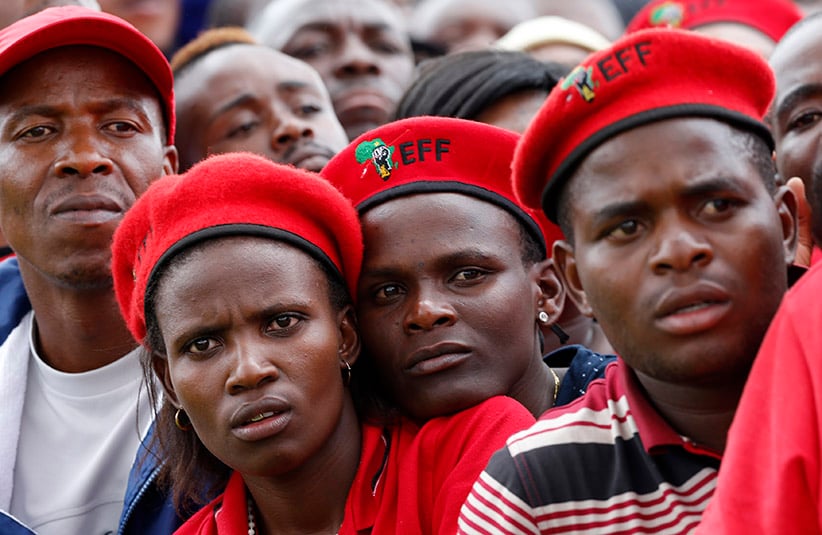
That rule might apply to Malema. After quickly rising through the ANC ranks, he started his own construction companies, earning a reputation as a tenderpreneur —a term in South Africa that refers to politicians who abuse their power to secure lucrative government tenders and contracts for their family and friends. In August, Malema is going on trial in his native Limpopo province for charges of fraud, corruption, money laundering and racketeering in connection with his businesses. The legal battles don’t end there. After settling his bill for $1.6 million in unpaid taxes in 2014, the taxman came knocking again, saying Malema lied about the source of his income. Now, in a twist of irony, Malema’s political career is on the line for his corrupt lifestyle during his tenure with the ANC. The tax matter will resume in court June 1. Should he be found guilty, he’ll be suspended from parliament.
Malema’s hypocrisy has many South Africans concerned he’s just a new iteration of the same old political story of personal enrichment trumping public service that threatens to upend the progress the country has made since the end of apartheid. “The notion of a South Africa belonging to all who live in it seems now to be an impossible ideal,” wrote Sello Hatang and Verne Harris, directors at the Nelson Mandela Foundation, in an article published in the Mail & Guardian, a weekly South African newspaper.
At the same time, however, others maintain Malema is exactly what the country needs to shake free of its ANC shackles and transition from a one-party state to a competitive democracy. As Everatt puts it, “It may well be that a different age cohort has left the ANC for the EFF en route to a real alternative, should it emerge.”
Given South African politicians’ seeming immunity to graft scandals, it’s unlikely the corruption cases will seriously hamper Malema’s momentum leading up to the 2016 municipal elections. It helps that the ANC is suffering its own problems following the disintegration of its influential partner and vote mobilizer: the Congress of South African Trade Unions. Meanwhile, the official opposition is divided as it elects a new leader.
Malema knows his future lies with the city voters. “We are going to ensure there is no single ward in the metros we are not contesting,” he says. For now, he has embraced his role as critic-in-chief, saying that the EFF is happy “eating from the ANC majority.” Next year’s priority is solely about cutting the ANC down to size. “If we can’t remove it from power, let’s humble it,” says Malema.
With the South African government calling in the military to police townships and the recent rioting, life in a democracy doesn’t look so different to life in apartheid for most South Africans, and that’s a “ticking time bomb,” he says. “The fear is the uprising, which is unled in South Africa as a result of poverty, unemployment and inequality,” says Malema. “What is going to be worse: they will not only eat the rich whites, they will also eat us, the black middle class, because they think we have abandoned them.”